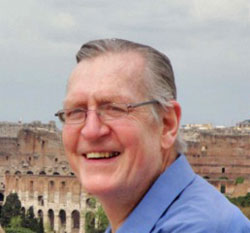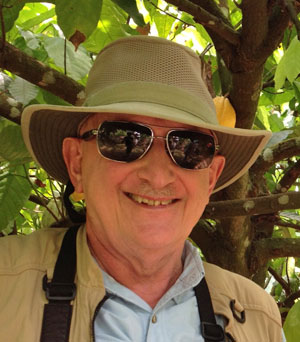Spring-Summer
2014
Where Are They Now?
Marcus Duke
In past issues, we have featured faculty—ranging from the newly minted to the imminently retiring. This time, we complete the “life cycle” by talking with four retired faculty to get their take on life after SAFS: Bob Francis, Don Gunderson, Jim Karr, and Bruce Miller. As you may imagine, they have engaged in diverse activities, ranging from continued aquatic science research to community service to artistic and other creative pursuits.
Bob Francis
In 1987, Bob Francis became the Director of the Fisheries Research Institute. After leaving that position, he remained on the SAFS faculty until he retired in 2005. He is well known for his research on climate and Northeast Pacific marine fisheries. His team was involved in discovering the Pacific Decadal Oscillation, and investigating ocean climate mechanisms that influenced salmon and Pacific hake production in the Northern California Current system.

Bob Francis in Cuba. Photo by Kathy Francis.
One of the highlights for Bob was revamping and teaching the Fish 101 (2001–2005). He changed the syllabus to focus on case studies of global bluefin tuna, Pacific Northwest salmon, and Western Pacific coral reefs. He said, “Our teaching team developed innovative techniques for learning about the aquatic world, its fisheries, and conservation. The fundamental mindset of the course was how the ‘heat of the sun and spin of the earth’ organized life in the ocean.”
Bob still sees colleagues and former students but noted, “I’m more interested in their lives away from science. I interact closely with Don Gunderson and Marcus Duke around mutual musical interests.” Music has been a major part of Bob’s life, and he always considered art and science to be inextricably related. He even gave a lecture once where he played piano to demonstrate correlations between music and his research.
When Bob retired, he decided to focus on music and poetry. He said, “My wife, Kathy, and I moved to Pt. Townsend, where we built a house with ‘dueling’ studios for both of us to pursue our artistic interests” (Kathy is a landscape painter).
Bob has led several musical ensembles that fuse jazz and classical music. His trio, Confluence, consisting of violin, oboe, and piano, celebrates the fusion of classical chamber music and small group jazz improvisation. He observed, “Confluence has become very popular on the Port Townsend nonprofit scene and we perform house or studio concerts to raise funds for local organizations.”
Bob also volunteers for Copper Canyon Press, a small nonprofit devoted to publishing poetry. And, Bob and Kathy put up a “poetry box” outside their house where they provide a poem a month to the community. He noted, “In the summer, we go through around 200 copies each month!”
Some say that you learn a lot about a person by looking in their refrigerator. For Bob, it’s the bulletin board in his studio, which includes a photo of Leonard Bernstein conducting Mahler’s 5th, arms outstretched, eyes ablaze, seeming to fall backwards off the podium; a pensive Bill Evans at the piano; a friend’s quixotic, Picasso-esque drawings of Bob after surgery, playing the piano, holding a golf club; and gig advertisements.
Looking back over his life, Bob advises, “Keep on truckin'. Life is not over at the end of a career. Since retiring, it seems I still learn something every day, for which I am thankful.”
Don Gunderson

Don Gunderson in Rome.
Photo by Petri Suuronen.
After 29 years on the SAFS faculty, Don Gunderson retired in 2007. Don was interested in issues relating to population dynamics, biology, and ecology of marine fishes. He and his students and colleagues investigated growth and mortality rates, stock sizes, and sustainable rates of harvest for groundfish off the West Coast and Alaska.
Working with David Armstrong, Don’s team also demonstrated the importance of coastal estuaries as nursery areas for both Dungeness crab and English sole—a topical subject given the extensive development of oil storage and transport facilities being considered in areas adjacent to our coastal estuaries.
Don talked about his most significant contribution: “We showed that natural mortality and annual reproductive effort are highly correlated, and that total lifetime reproductive output is roughly constant across different species of fish. Each species has made evolutionary tradeoffs in age at maturity, longevity, and fecundity to persist.
Since retiring, Don has remained involved in fisheries science: “Working with international fisheries, together with the humbling experience of trying to manage a small ranch in Montana, left me somewhat obsessed with the incredible challenges we face in managing complex, poorly understood ecosystems. We need to confront this problem creatively and address it effectively.”
This perspective motivated Don to spend the first three years of retirement writing “The Rockfish's Warning.” Published in 2011, this book addresses the quest for sustainability in managing natural resources.
You can still see Don on campus or at NOAA, where he attends seminars and follows his former students and other colleagues’ efforts to manage resources sustainably. He said, “The recent Bevan Symposium clearly showed that years of effort by scientists, fishermen, processors, and managers in Alaska and the Pacific Northwest yielded management programs that serve as models for the rest of the nation.” He feels privileged to have been involved in work that led to profitable, sustainable groundfish fisheries.
Don cautioned that serious challenges remain, particularly in managing nearshore groundfish fisheries. For his part, he is serving on panels that have advised the Washington Department of Fish and Wildlife and NOAA on Puget Sound rockfish management.
Don is well known for his exceptionally diverse musical interests, ranging from classical music to hip hop and seemingly everything in between. He also plays guitar and he has even written several songs, some of which he has performed for his Friday Harbor Labs class (a captive yet appreciative audience).
Retirement has allowed Don to participate in diverse cultural opportunities in Seattle, to read more broadly, and to travel. He also took up tropical scuba diving in tropical reef ecosystems, saying “I feel incredibly fortunate to have done this.”
Jim Karr
Jim Karr joined the SAFS faculty in 1994. Previously, he was Director of UW’s Institute for Environmental Studies, as well as a SAFS adjunct professor. Still earlier, he ran a long-term research program on the ecology of tropical forest birds in Panama. One of the first such studies, the program began in 1968, and it continues today through one of his former postdocs.

Jim Karr. Photo by Ellen Chu.
For many years, Jim also studied stream fish and invertebrates, land use, and water quality in the United States. He developed the index of biological integrity (IBI), a methodology for assessing water body condition that has been adopted or modified for use in at least 67 countries. With many colleagues, he has helped synthesize research about the ecological consequences of land management on western public lands and waters, including the effects of salvage logging after fires, grazing by hoofed mammals, and the effects of forest roads on water quality and stream health.
In recent years, Jim has focused on understanding past and present societies and applying what he learns to the challenges of sustainability. After retiring in 2006, he continued teaching his “Attaining a Sustainable Society” course for three years. He remains a prolific writer, having published dozens of journal articles (several with former students), reviews, columns, and blogs since retiring.
In 2006, Jim moved to Sequim, Washington, where he has worked with numerous regional and nationwide organizations in sustaining living resources. These include the Streamkeepers of Clallam County, the Olympic Peninsula Audubon Society, the Lake Tahoe Regional Planning Authority, the South Florida Water Management District, the National Research Council, the World Wildlife Fund, and the Government Accountability Office.
He has also lectured on trips for UW Alumni Travel, as well as The Smithsonian Institution’s travel program, which has enabled him to visit nearly 30 countries on five continents. Not content with activities only in ecology, Jim also volunteers through AARP to help local residents with tax preparation. And he continues to go fly-fishing often.
Jim talked about the philosophy behind his activities: Besides teaching and doing research, he said, “University professors are expected to serve the larger society.” He believes that what he does should aim to benefit the public, “whose tax dollars paid for my education and research. In many respects, this is a social contract explicit in my acceptance of public subsidies.”
Retirement has not altered this conviction. “I tried to walk that talk before I retired, and I have been fortunate to have opportunities to keep trying after retirement. I have learned how people interpret things ranging from birdwatching to climate change to income inequality to the origin of human foods. I have been challenged to craft lectures for audiences from all income brackets and walks of life—lectures that not only inform but also help people think about human society in the broadest possible ecological, social, and historical contexts.” All in all, he says, “these activities have added up to be the best job I could have hoped for.”
Bruce Miller
When he retired in 2002, Bruce Miller had been on the SAFS faculty for 27 years. He also served as Interim Director for the Fisheries Research Institute after Robert “Bud” Burgner (see article about Burgner, this issue) retired and before Bob Francis succeeded him. Bruce quipped, “Bud was desperate to retire and I think I was the only person he could find to take on the job!”

Bruce Miller. Photo by Ken Adkins.
Bruce’s teaching and research focused on the ecology and early life history of marine fishes, with an emphasis on Puget Sound fishes. He reflected on his efforts: “Besides (hopefully) inspiring students about what great professions fish biology and ecology are, I felt that the Puget Sound research we did had a substantive impact on decisions regarding shoreline development, marine reserves, pollution effects, and in generally evaluating and improving the ecological health of Puget Sound.
After retiring, Bruce continued to work part-time, co-teaching the Marine Fish Ecology course at the Friday Harbor Laboratories (FHL) with SAFS colleague, Don Gunderson, and Karel Liem from Harvard. He also shepherded about a half dozen MS and PhD students through their degree programs. He then spent much of his time working with Art Kendall (NOAA Fisheries) on the book, Early Life History of Marine Fishes (2009), which used material from classes he and Art taught at SAFS and FHL.
Since publishing his book, Bruce has continued to conduct research. One project, with co-investigator Kerim Aydin (PhD 2000, Bob Francis, adviser), focuses on marine biological interactions in the North Pacific. The main subject is the trophic (feeding) dynamics of key fish species ranging from the Eastern Bering Sea to the waters off the West Coast. He is also a principal investigator, with co-investigator Kirstin Holsman (PhD 2006, David Armstrong, adviser), on a North Pacific Research Board project on halibut ecology, fisheries, and climate change.
Bruce added, “I’ve also sponsored and guided a number of undergraduate student capstone projects.” Most recently, Bruce has returned to his roots by conducting early life-history research.
Outside work, Bruce and his wife have traveled a lot, including frequent visits to Sweden to visit with his daughter and family. Like Don Gunderson, he has been SCUBA and snorkel diving, although lately he now spends more time reading out on his deck either at home or at his cabin near Lake McMurray.
Reflecting on his over three decades at SAFS, Bruce said, “ I think my experience at the School, and also the considerable and wonderful time I spent at FHL, was particularly rewarding in the sense of seeing my former students doing so well professionally, and nearly all having good jobs in some aspect of fish ecology; I have really enjoyed hearing from many of them.”
